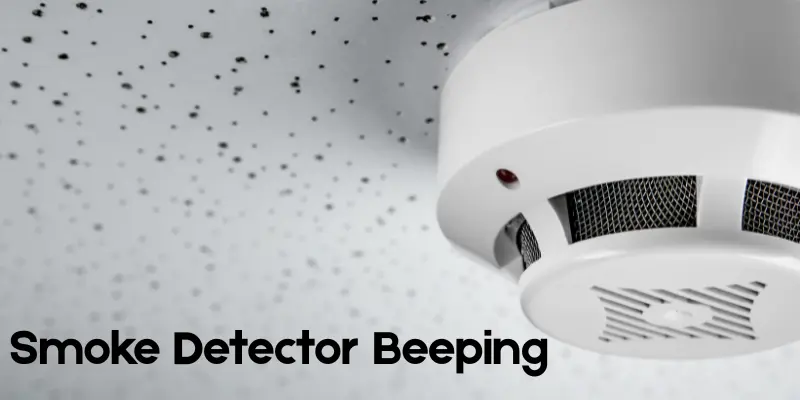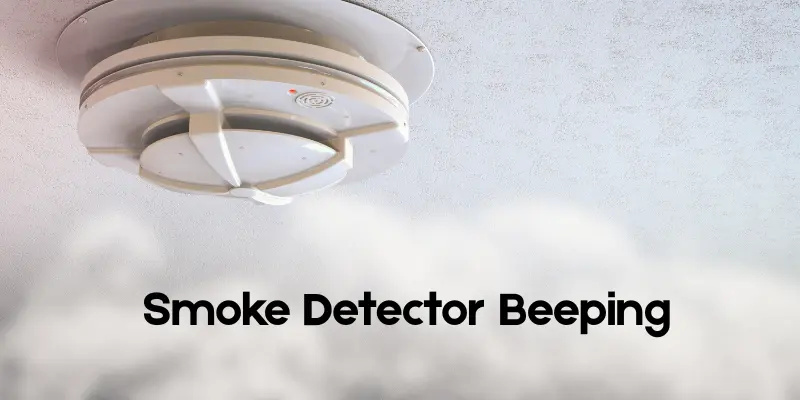Smoke Detector Beeping: What It Means and How to Stop It
Updated: 6-Jun-2025
342
A smoke detector beeping unexpectedly can be alarming, annoying, and sometimes confusing. Whether it’s a sharp chirp or a consistent beep, these sounds are not random—they are vital alerts that should never be ignored. Understanding the reasons behind a beeping smoke detector and how to fix it is crucial for maintaining home safety and preventing false alarms or worse—ignoring a real fire.

In this comprehensive guide, we explore what smoke detector beeping means, why it happens, how to troubleshoot it, and what to do if your smoke alarm keeps beeping even after taking action.
What is Smoke Detector Beeping
Smoke detector beeping refers to the audible warning signals emitted by a smoke detector to indicate an issue. It can range from a single intermittent chirp every few minutes to a loud, continuous alarm. While a continuous alarm often signals smoke or fire, a single beep usually points to maintenance issues such as a low battery, dust accumulation, end-of-life warning, or faulty sensor.
Common Causes of Smoke Detector Beeping
Low Battery Warning
- One of the most common causes of smoke detector beeping is a low battery.
- The detector emits a short, consistent chirp every 30 to 60 seconds.
- Replacing the battery often solves this issue.
Expired Smoke Detector
- Most detectors have a lifespan of 8–10 years.
- An end-of-life beep will persist even with new batteries.
- Replace the unit if it’s outdated.
Dust or Debris Accumulation
- Dust, cobwebs, or insects can interfere with the smoke sensor.
- Clean the device using a vacuum or compressed air.
Environmental Interference
- High humidity, steam from showers, or temperature extremes can trigger false beeping.
- Install detectors away from kitchens and bathrooms.
Power Supply Problems
- Hardwired detectors may beep if there is a power interruption or if backup batteries are weak.
- Check electrical connections and circuit breakers.
Reset Required After Alarm
- After a false alarm or smoke exposure, some models keep beeping until manually reset.
- Press the reset button or disconnect/reconnect power.
Multiple Detectors Connected
- In interconnected systems, an issue with one unit can trigger beeping in others.
- Check all detectors in the circuit.
How to Stop Smoke Detector Beeping
Follow these steps to troubleshoot and stop the smoke detector beeping:
Replace the Battery
- Use a fresh battery compatible with your model.
- Check the manufacturer’s instructions.
Clean the Detector
- Use a soft brush or vacuum nozzle.
- Avoid water or cleaning chemicals.
Reset the Detector
- Press and hold the reset button for 15–20 seconds.
- Some models may require disconnection from power first.
Check Expiry Date
- Look for the manufacturing date on the back.
- Replace if over 10 years old.
Inspect Power Supply
- Ensure hardwired models have no power failure.
- Check circuit breakers or fuses.
How to Prevent Smoke Detector Beeping
- Change batteries twice a year (commonly during daylight saving time changes).
- Test alarms monthly using the test button.
- Clean devices every 6 months to prevent dust build-up.
- Install units properly, away from vents, fans, and humid areas.
- Replace old detectors every 8–10 years.
Types of Smoke Detector Sounds and Their Meanings
| Sound | Meaning |
|---|---|
| Loud, continuous alarm | Smoke or fire detected |
| Short chirp every 30–60 sec | Low battery or maintenance required |
| Series of three beeps | Smoke/fire alarm (depending on the model) |
| Four beeps + pause | Carbon monoxide alarm (combo units) |
| Beeping with flashing light | Device needs service or battery change |
How to Tell if Your Smoke Detector is Malfunctioning
You can tell a smoke detector is malfunctioning if:
- It beeps every 30 to 60 seconds despite new batteries.
- The test button does not trigger a sound.
- It gives false alarms frequently without any smoke present.
- The LED indicator is off, flashing irregularly, or shows an error code (varies by model).
- It’s over 10 years old—most models expire and require replacement.
- The unit has visible physical damage or corrosion on terminals.
Why Is My Smoke Detector Beeping Every 30 Seconds
If your smoke detector beeps every 30–60 seconds, it typically indicates a low battery. Other possible causes include:
- End-of-life warning (device is expired).
- Loose or improperly installed battery.
- Dust or debris blocking the sensor.
- Power interruption in hardwired models.
What Does 3 Beeps on a Smoke Detector Mean
Three loud beeps, often repeated in a cycle, usually indicate:
- Smoke or fire detection in the area.
- A real emergency requiring evacuation.
- A test signal if you’re pressing the “Test” button.
Guide to Use a Smoke Detector
Installation and Usage Guide:
- Install smoke detectors in every bedroom, hallway, and each level of your home.
- Mount on the ceiling (preferably), at least 4 inches from walls.
- Avoid areas near vents, fans, kitchens, and bathrooms.
- Test monthly by pressing the test button.
- Change batteries every 6–12 months.
- Clean every 6 months to remove dust.
- Replace the unit every 10 years.
Best One Smoke Detector
One of the top-rated all-in-one smoke detectors in 2025 is:
Google Nest Protect (2nd Gen)
- Dual-sensor (smoke & CO)
- Wi-Fi enabled with smartphone alerts
- Voice alerts and light indicators
- Self-testing and night light features
- 10-year life span
Requirement of a Smoke Detector
Legal and safety requirements (may vary by country/state):
- One detector per bedroom
- One outside sleeping areas
- One on each level, including basement
- Hardwired models with battery backup for new constructions
- Regular testing and maintenance required
- Compliance with UL 217 standard (in the U.S.)
Limitation of a Smoke Detector
Despite being essential, smoke detectors have some limitations:
| Limitation | Explanation |
|---|---|
| False Alarms | Triggered by cooking, steam, or dust. |
| Battery Dependency | Stops working if batteries die (especially older models). |
| No Fire Suppression | Only provides warning; does not control or extinguish fire. |
| Sensor Type Limitations | Ionization vs. photoelectric—each is sensitive to different fires. |
| Limited Detection Range | May not detect smoke from distant rooms without multiple units. |
| Not Always Smart-Compatible | Older models lack remote alerts or app control. |
FAQs About Smoke Detector Beeping
Why is my smoke detector beeping with a new battery
It may require a reset or the unit might be expired.
Can high humidity cause a smoke alarm to beep
Yes, moisture can affect the sensors. Consider relocating the unit.
How often should I replace smoke detector batteries
Every 6–12 months, even if the device seems fine.
How do I reset a smoke detector
Hold the reset button for 15–20 seconds. Some models require disconnection first.
What if my hardwired smoke detector keeps beeping
Check for power issues, expired device, or backup battery problems.
Summary
The keyword “smoke detector beeping” is not just a nuisance—it’s an important safety feature. Whether it’s a chirp indicating low battery or a false alarm from dust, understanding the different sounds and taking the appropriate steps can save lives. Regular maintenance, timely battery replacement, and knowing when to replace the entire unit are essential practices every homeowner should follow.
Conclusion
A beeping smoke detector is your home’s way of communicating potential issues—either with its functionality or a real threat like fire or carbon monoxide. Ignoring these alerts can lead to dangerous consequences, while promptly addressing them enhances your safety and peace of mind. By staying proactive with regular maintenance and understanding the meaning behind the sounds, you can ensure your smoke detectors remain reliable and effective.

Whether you’re dealing with a simple low battery chirp or a persistent false alarm, the steps outlined above will guide you toward a solution. Always prioritize safety—and when in doubt, replace the device or consult a professional.
Please Write Your Comments